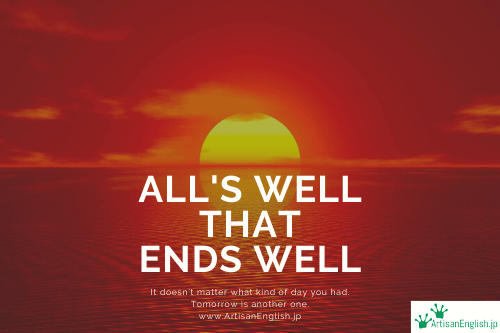
YouTube / iTunes / Spotify / Radio Public / Pocket Casts / Google Podcasts / Breaker / Overcast
Listen to ArtisanEnglish.jp posts & lesson intros here.
Proverb: All’s well that ends well
Life is full of trials and tribulations (difficulties), but at the end of the day, all’s well that ends well.
This means that a happy outcome makes up for all of the problems you had to go through.
When experts give advice on achieving happiness, they often say we should do something that makes us happy.
Who knew?
For example, If you don’t like your job, you should quit and find another.
The problem with that is there is nothing better after a hard day’s work than an ice-cold beer.
If you quit your job, you don’t work hard, and then the beer doesn’t taste the same.
I won’t even mention that if you’re not working, you have no money to purchase beer in the first place.
Like or follow ArtisanEnglish.jp on social media.
You see, if you listen to the experts and quit your job, then the proverb all’s well that ends well doesn’t work at all.
This proverb came from our ancestors, who knew about life and how to enjoy a good beer.
They knew that to indeed be happy and enjoy it, people must first suffer.
Trials and tribulations, hardship and suffering, are part of the lead-up to the realization of happiness.
This is why the invention of beer by our ancestors is so important.
They knew that the best way to get over all the challenges we face during the day is to forget about them, and the best way to forget is to drink beer.
After a couple of beers, you forget everything, fall asleep and wake up the next day ready to suffer again – all’s well that ends well.
Flesch-Kincaid Readability Test
This post is understandable by someone with at least a 7th-grade education (age 12).
On the Flesch-Kincaid reading-ease test, this post scores 77.
The easier a passage is to read, the higher the score on a scale of 0 – 100.

